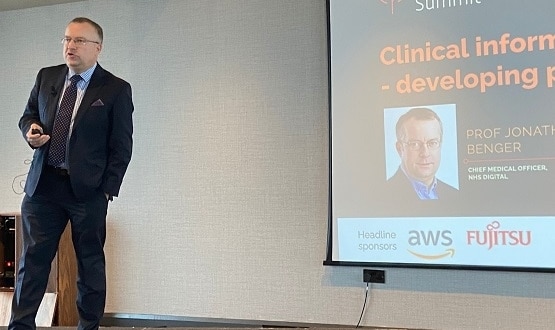‘Take the workforce with us’ for successful integration
- 8 October 2021

To successfully integrate the NHS organisations need to “take the workforce with us”, the chief medical officer of NHS Digital has said.
Speaking at day two of Digital Health’s Autumn Leadership Summit, Professor Jonathan Benger stressed the importance of changing culture around technology and understanding the workforce’s need.
“If we want to integrate we need to make sure we take the workforce with us,” he said.
“The reality is clinicians listen to clinicians… so if you want to sell an idea to a clinician you need to take a clinician with you.
“So that means we need clinical informaticians through the entire organisation.”
Benger reminded the audience technology needs to address a need for it to be widely adopted.
“The system is not transformed by digital technologies… that error is a pervasive error that goes throughout our entire systems,” he said.
“If we want technologies to stick and to enact digital transformation then we need to make sure they are fulfilling a real need.
“And we need to make sure clinicians are embedded in that process to represent the views of clinicians and the views of clinical patients.”
Benger wrapped up his keynote address saying it was “absolutely critical” that clinicians can spend more time with patients to provide quality healthcare.
“We have to make digital technology to work in a way that allows people to spend more time with people,” he added.
“Healthcare is a fundamental human-to-human interaction.”
Reducing digital pathways
Benger was joined by Dr Simon Eccles, CCIO at NHSX, who spoke of the need to reduce the number of digital pathways patients use to access the NHS to ensure safety.
He gave the NHS App as an example of successful digital pathways, which he said is largely down to the introduction of Covid-19 passports. There are now more than 26 million NHS login accounts being used, up from four million at the beginning of 2021.
“We can significantly protect the safety of patients if we reduce the number of [digital] ways access to NHS services,” he said.
To address safety around the use of technology NHSX recently launched its Digital Clinical Safety Strategy, which Eccles said is about a whole system approach.
The strategy aims to help the NHS provide a safer service when using digital technology, including through training and better use of data.
“It stops being about the safety of the digital system itself and moves into the safety of the collective system in use,” he said.
Eccles added that having digital care “completely coordinated end-to-end is important”.
The keynotes echoed messages from the first day of the conference, when Tom Loosemore from Public Digital said that when it comes to transformational change – the focus should be on culture rather than the technology.





1 Comments
Blah blah blah
Not exactly ground-breaking stuff is it?
Are the rumours about Benger replacing Eccles true?
Comments are closed.